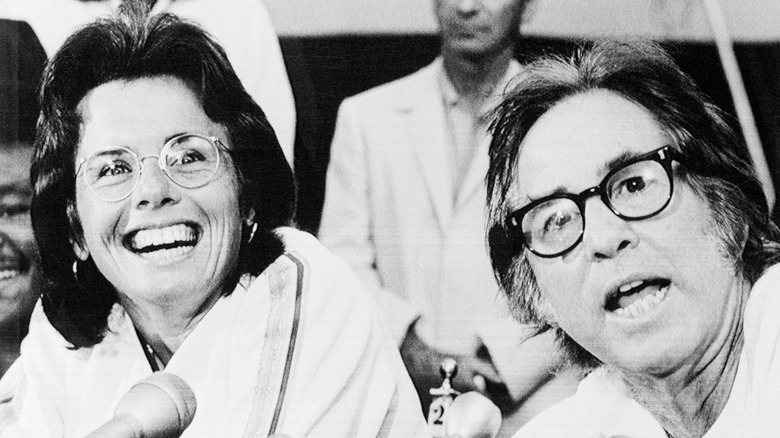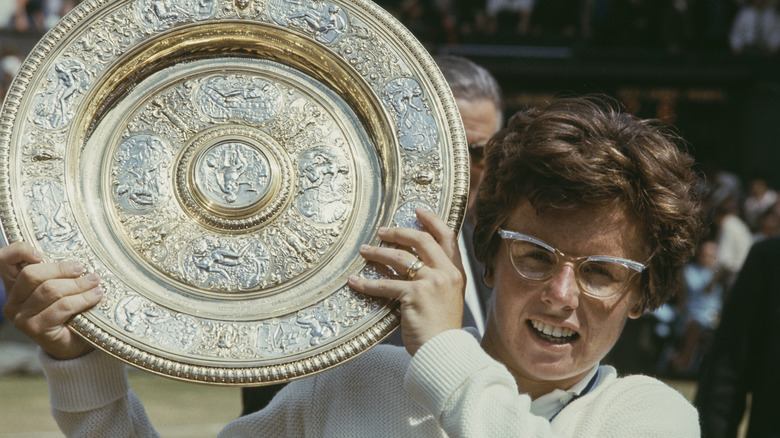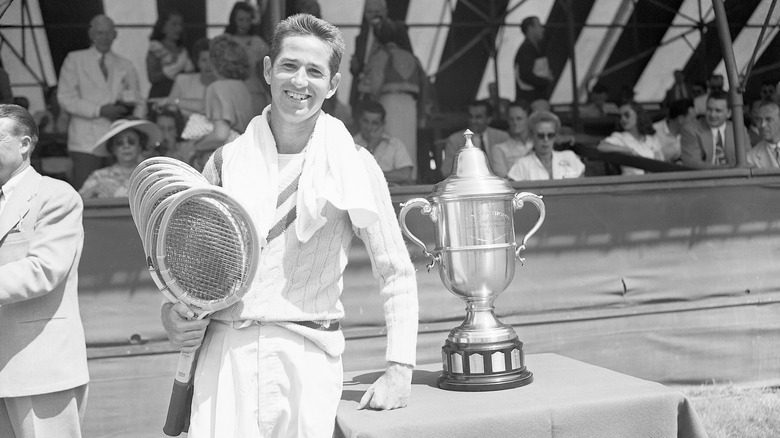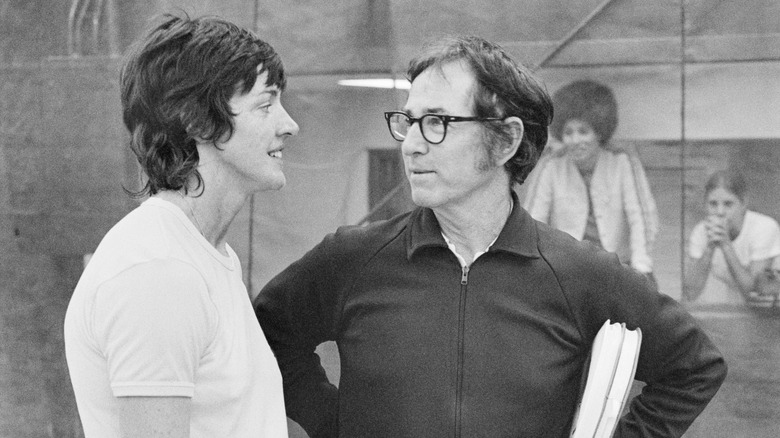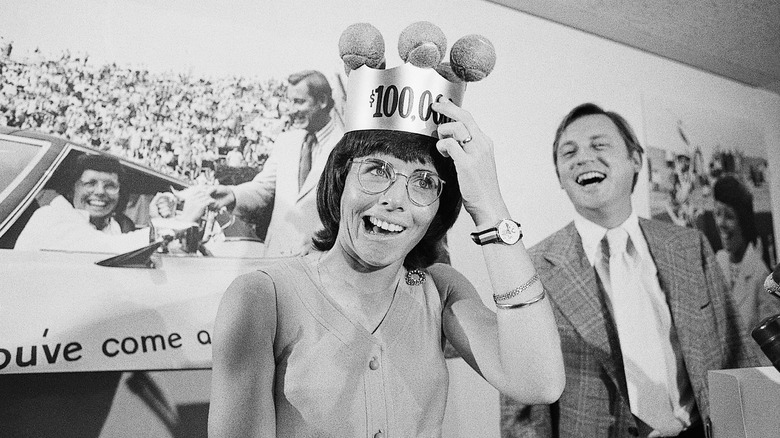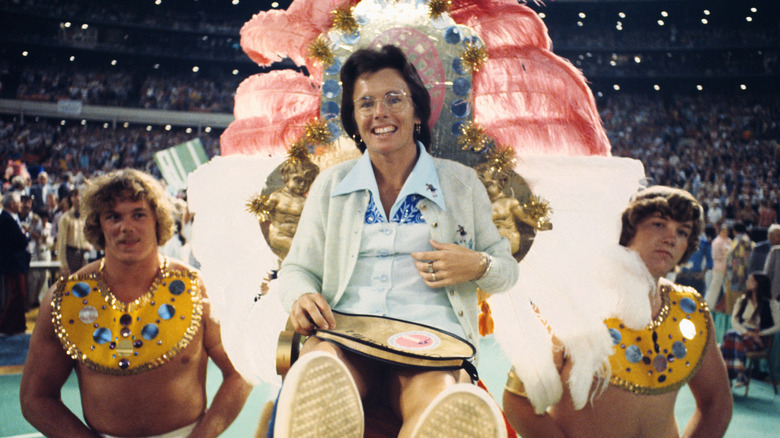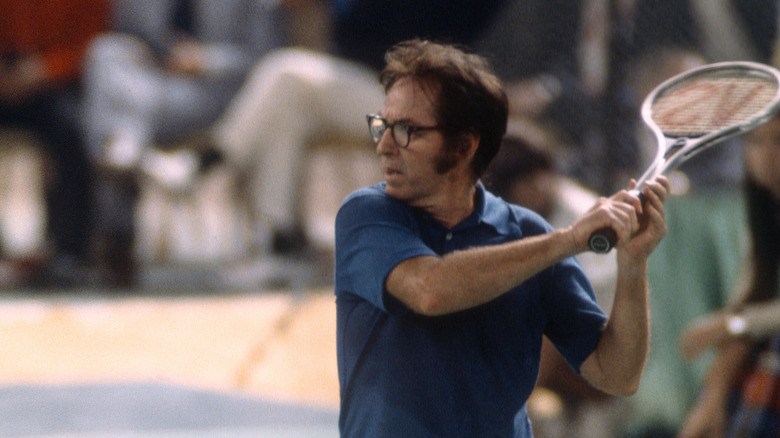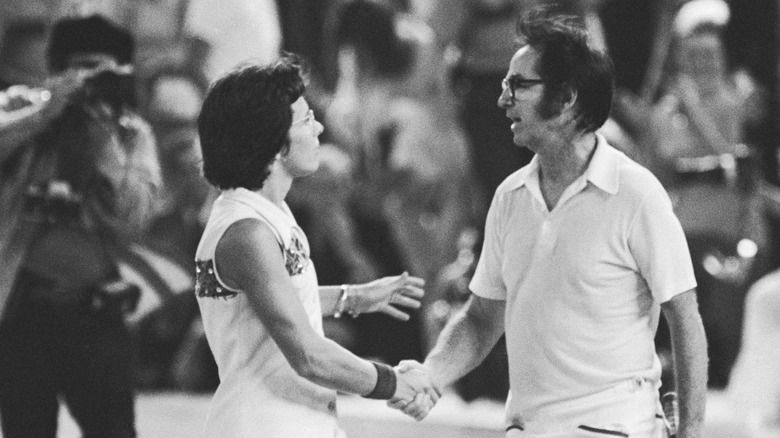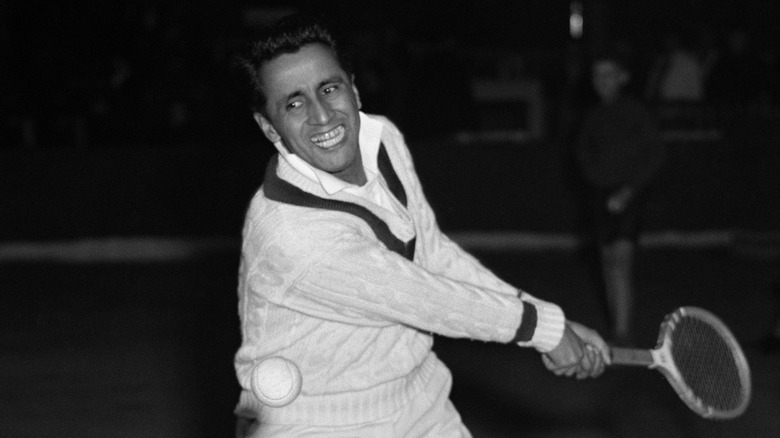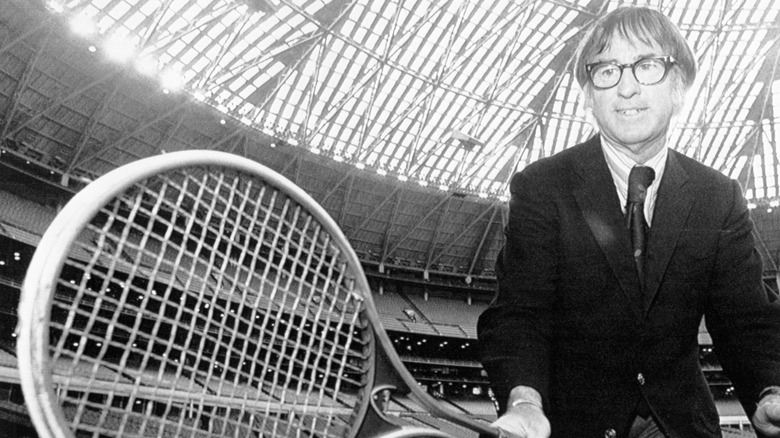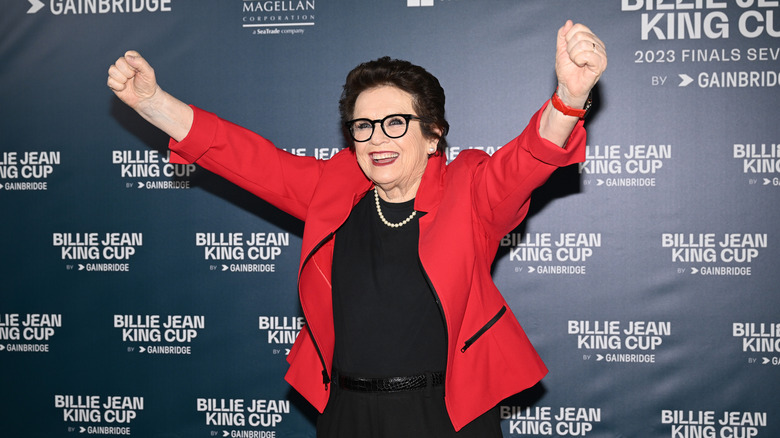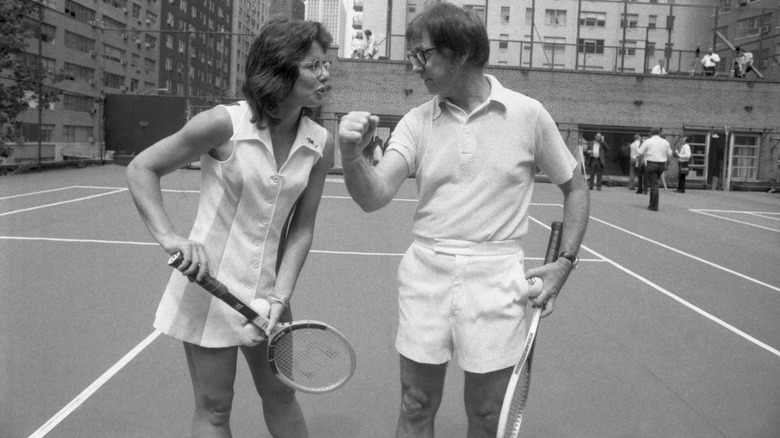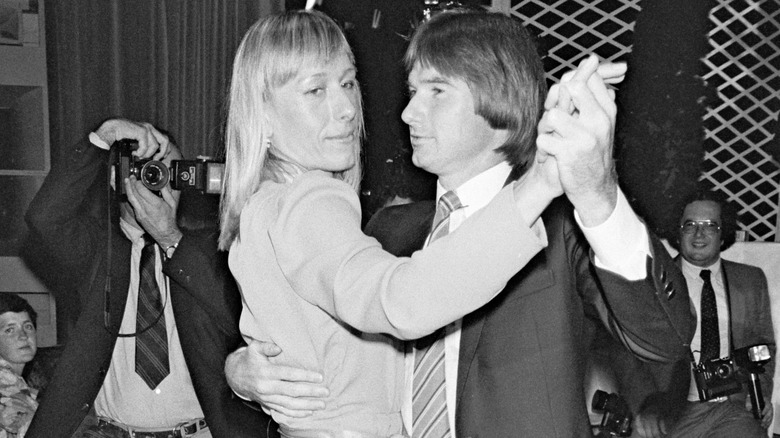The True Story Of The Battle Of The Sexes: Billie Jean King Vs. Bobby Riggs
The late 1960s and early '70s were a time when women were just beginning to make serious inroads into the male-dominated world of... well, the male-dominated world. In 1970, women had held the right to vote for 50 years — and yet, parity between the genders was still in a dismal state, so much so that in August of that year, the National Organization for Women sponsored a "Women's Strike for Equality March" through the streets of New York City that drew a staggering 50,000 participants. "Women's lib," as it was called then, was big news, as women were rightfully calling out the lack of equal footing with men in all areas — including the world of sports.
Back then, one of the biggest spectator sports in the U.S. was tennis. In 1968, professional players had finally been allowed entry into the sport's Grand Slam tournaments, and that year saw the first live broadcast of the U.S. Open; it was followed the next year by Wimbledon, and suddenly, stars began to be made of the sport's top players. In 1970, a group of nine elite women, determined to prove their mettle, formed a new tournament, the Virginia Slims Invitational at the Houston Racquet Club — a situation that didn't sit well with that era's top male players. In 1973, the situation came to a head — with a match for the ages between top-ranked women's player Billie Jean King and tennis legend Bobby Riggs, a match that came to be known as the "Battle of the Sexes."
Billie Jean King was one of the best players in the world
By 1973, the Virginia Slims Invitational had evolved into the Virginia Slims Circuit. Billie Jean King was a central figure in this evolution, as at the time, she was pretty much to women's tennis what Michael Jordan would later become to basketball. At the dawn of the "Open Era" in 1968, she won the women's singles title at Wimbledon; in 1971, she became the first female tennis player to notch six figures in winnings in a single year. In '73, she founded the Women's Tennis Association, ensuring that when the U.S. Open was played that year, the women — for the first time — would be paid as much as the men. By this time, she had been ranked No. 1 in the world five times, and won more than 30 singles tournaments.
King's dominance was born out of a fierce desire to prompt change in the realm of gender equality, which explains why she became so passionately invested in elevating the women's game relatively early in her career. Speaking with The Guardian in 2017, she explained that even long before women's tennis was a pro sport, she knew that only intense drive would enable her to help enact that change. "[Tennis] would give me a platform, if I was good enough. I'd have to be No. 1 and I knew as a girl it wouldn't be the same as a guy — it's going to be harder, it's going to be different," she said. "It is. [Women] go unnoticed."
Bobby Riggs was a tennis legend who was past his prime
Firmly on the other side of the gender equality question was Bobby Riggs, a long-retired pro who knew a thing or two about winning. In 1939, at only 21 years old, Riggs had achieved his first world No. 1 ranking; that year, he had claimed all three major titles at Wimbledon, and the U.S. Championship (now the U.S. Open) for good measure. He collected three more Championship titles in the '40s, earning a reputation for his smarts on the court; he was only 5 foot 7 inches tall, but what he lacked in stature, he made up for with a calculated game designed to take advantage of his opponents' weaknesses.
By the early '70s, he was still a fervent promoter of his sport — and of the opinion, loudly and publicly, that the women's game was flat-out inferior to the men's. Riggs even proudly called himself a "male chauvinist pig," and claimed that even in his 50s, he could beat any female player in the world. Billie Jean King would later say that Riggs had pursued a match with her for years, but busy as she was advancing the sport Riggs was attempting to tear down, she kept declining. Eventually, Riggs set his sights on another target, the aptly named, highly ranked Margaret Court — and Court gave Riggs what he wanted.
The first battle of the sexes
Australian Margaret Court was no mere substitute for Billie Jean King; she was extremely formidable, and in 1973 was considered to be perhaps the greatest female player of all time. The winner of 22 singles titles, she was tall, strong, and quick, not to mention confident that she could beat Bobby Riggs and earn a substantial paycheck. Unlike King, though, she didn't quite grasp the stakes of signing up to play against Riggs, considering it to be a simple exhibition match. When Court arrived in Ramona, California, where the match was to be played, she was greeted by a man who had trained intensely for the match and was keen to get into her head early and often. "Do you realize, Margaret, that this is the most important match ever played?" RIggs reportedly asked her (per Tennis Majors). "Just think how many women are counting on you."
King understood all too well that if Court were to lose, there was the very real risk that all of the gains in women's tennis she and others had fought so hard for might be wiped out — and unfortunately, an unprepared Court failed to put those fears to rest. On May 13, 1973, in a match that would later be termed the "Mother's Day Massacre," Riggs annihilated Court 6-2, 6-1. Riggs was not exactly humble in victory. "Don't ever count me out. Now I want King bad," he said after the match. "I'm a women specialist now. I'm going around the world to challenge all the women champions."
Billie Jean King steps up
Before Margaret Court's match with Bobby Riggs, Billie Jean King had quietly resigned herself to finally accepting his challenge if he were to prevail over Court. In a sit-down with NPR in 2008, she recalled the moment that she knew she finally had to give in to his pursuit. "When I came back from Japan and heard the score, I just said, 'Well, I have to play him now,'" she recalled — and she wasted no time preparing herself for the biggest match of her career.
In a 2021 Harvard Business Review (HBR) interview, King remembered that once the match had been scheduled at the Houston Astrodome, she realized that she was already scheduled to play in the Virginia Slims Invitational the same week, and the tournament promoter wouldn't allow her to back out. "So I played both, which was hard," she said. Still, King was determined to give herself every advantage she could. "My preparation was impeccable," she told NPR. "The day before the match, I went into the Astrodome to check it out because I knew it wasn't a normal tennis stadium ... I met all the security guards ... I knew where all the elevators were, I knew where my locker room was going to be." She also, as she explained to HBR, prepared herself mentally: "From the time I knew I was going to play Bobby, I visualized," she said. "I thought about playing well, running down every ball, not caring if the surface was horrible, adapting."
The pre-match atmosphere was that of an absolute circus
Those who were not around at the time may not grasp the extent to which the '70s was an extremely flamboyant decade, and for an event like Billie Jean King vs. Bobby Riggs — which quickly came to be known in the press as the "Battle of the Sexes" — the organizers decided upon a level of glitz and pageantry that would put any modern Super Bowl to shame. For starters, there were an absurd number of celebrities in attendance; the likes of Glen Campbell, George Foreman, Jim Brown, Andy Williams, and Jo Ann Pflug (wearing a jersey emblazoned with "I'm a Billie Jean King Fan") were there for the festivities, along with legendary announcer Howard Cosell, who was calling the match.
King was carted in on an elaborate divan by four shirtless male models in Egyptian dress, while Riggs arrived on the court in a rickshaw pulled by buxom female models. An 80-piece marching band from the University of Houston and a Rockettes-style chorus line of dancing girls were also part of the festivities, and even the umpire sported a gray velvet tuxedo and red ruffled shirt; the whole thing bore a stronger resemblance to some kind of mega-circus than to a sporting event. Speaking with NPR, King remembered, "It was pure entertainment ... Bobby gave me a big Sugar Daddy because he was getting a lot of money from Nabisco, and then I gave him a piglet, a little baby, with a little bow around his little neck. He was so cute."
Riggs came on strong in the first set
When the match got underway, Billie Jean King and Bobby Riggs were all business — particularly Riggs, who looked positively grim. In the early going, his play was confident enough to register as cocky, while King took a more cautious approach, and it began to look like a dynamic that could translate into another rout by Riggs. In the first set, Riggs put together a run of seven straight points, and it appeared as though he had King on her heels — but you know what they say about appearances.
King, in fact, had a plan, and unbeknownst to Riggs, he was playing right into it. In her NPR sit-down, King broke down her gameplan going into the match — one which played out beautifully. "I thought, you know, I know I should play my game, but I think what I'm going to do is have five rallies," she said. "I'm going to run him into the ground, and it doesn't matter if I win the point or not, but that I have to do, and I have to do it in the first set ... I purposefully hit the ball as softly as I could ... and the court was quite dead, meaning you have to get up to the ball." Before long, the strategy began to take a physical toll on Riggs — which is when King turned the tables.
King took over and won the match easily
With Bobby Riggs already running out of gas early in the match thanks to Billie Jean King's merciless opening strategy, King showed why she was one of the top athletes in the world. She sent everything Riggs had flying back at him, and more often than not, past him; of the 109 points she scored in the match, 70 of them sailed right by Riggs without him being close enough to the ball to even attempt to return them. King got to the net far more quickly than her opponent could, smashed his signature lobs to the far corners of the court, and simply ran him ragged for the entirety of the match, one that Riggs never meaningfully threatened to get into. In the end, King didn't just beat Riggs; she destroyed him in straight sets, 6-4, 6-3, 6-3.
To his credit, Riggs made no excuses for his loss, and gave King all the credit for simply outplaying him. "She played within herself all night," he said after the match. "She was never extended. The girl was all over me the whole time. I didn't know Billie Jean was so quick" (via Sports Illustrated). Speaking with Today in 2023, King recalled that after her dismantling of Riggs, her opponent had three simple words for her. "When we shook hands, put our arms around each other, he said, 'I underestimated you,'" she said.
Some still weren't convinced
Of course, it's not as if Billie Jean King's victory turned all of Bobby Riggs' fellow "male chauvinist pigs" into devout feminists overnight. As is to be expected, there were several observers who downplayed the victory, most notably Jack Kramer, a former pro and peer of Riggs who essentially blamed Riggs for not preparing himself properly. "I don't think Billie Jean played all that well," Kramer said after the match, as noted in the historical compendium "On This Day" by David J. Phillips. "She hit a lot of short balls which Bobby could have taken advantage of had he been in shape ... it might have been different if Riggs hadn't kept running around."
Kramer wasn't the only one to suggest that King's victory came down to the quality of her opponent. Pancho Segura (pictured), another former pro who was currently playing on the senior circuit, went so far as to suggest that Riggs was in no way the best player on that circuit; indeed, Segura was, so he claimed, and therefore, King should play him in order to really prove her mettle. Unsurprisingly, King declined.
Riggs fell under suspicion of throwing the match
Perhaps even more insultingly, there are some parties who speculated — and continue to speculate — that Bobby Riggs actually lost intentionally to Billie Jean King, throwing the match in order to cover gambling debts. Riggs was indeed known as a gambler, and in an interview with NPR, ESPN reporter Don Van Natta elaborated on an interesting bit of hearsay: He had spoken with a man named Hal Shaw, the owner of a Florida pro shop, who had told him of an alleged late-night conversation he had overheard in his shop in 1973 between two former mob bosses and their associates. In this conversation, they supposedly went on at length about how Riggs had agreed with them to defeat Margaret Court, and then to lose to King, in order to cover more than $100,000 in debts to them; it was not explained who they were discussing this with, or indeed, what the heck they were doing in Shaw's shop in the middle of the night.
These allegations came to light long after Riggs' death in 1995, but when King got wind of them, she dismissed the idea outright. "There is no question," NPR quoted her as saying. "I have played matches where players have tanked, and I know what it feels like, and I know what it looks like; and he did not."
King gets a lot of credit for fighting for equality in women's sports
The founding of the Women's Tennis Association and her demolition of Bobby Riggs in the "Battle of the Sexes" were just the beginning for Billie Jean King. As of this writing, she is 80 years old, with that historic match five decades in the rearview mirror — and she never for a single day stopped fighting for equality in women's sports. In 1973, she fully understood the implications of her win: "I honestly didn't think beating Bobby was a huge accomplishment athletically," she said in a 2023 interview with WTA's website, "but we wanted to change hearts and minds and I knew the worldwide reach it could have. It had an important effect psychologically and emotionally."
In the years since, she and her wife, Ilana Kloss, have obtained ownership stakes in the Los Angeles Sparks of the WNBA, Angel City FC of the National Women's Soccer League, and even the Los Angeles Dodgers. In addition, after talks with NHL commissioner Gary Bettman about starting a women's hockey league fell apart, King and Kloss partnered with Dodgers ownership instead, and got it done; the new league is set to begin play in 2024. In September 2023, when King presented U.S. Open winner Coco Gauff with her $3 million check for her victory, Gauff said what was on the minds of women's sports champions everywhere: "Thank you, Billie," she said, "for fighting for this."
King and Riggs were friends until the end of his life
One might think that Billie Jean King would have made a lifetime enemy of Bobby Riggs by defeating him, but nothing could be further from the truth. Although they didn't know each other personally before Riggs' challenge, they developed a cheeky, almost-friendly rapport leading up to it — and after the match, they became close friends, and remained so until Riggs' death in 1995 at the age of 77. They spoke on the phone fairly often, with the last of those calls coming the day before Riggs died. Riggs' son, Larry, shared with Inside Edition the substance of that call in 2017: "She said, 'Bobby, I want you to know I love you a lot.' He said, 'Billie, I love you too and we did something big together,' and she said, 'Bobby, we did.'"
In a 2023 Instagram post, King acknowledged Riggs' birthday with a message for tennis fans everywhere. "As for Bobby and me, many though we were bitter enemies. Now, the truth was, we were friends. I'm thinking about you today on your birthday, Bobby, and I'll be thinking about you again in September [on the 50th anniversary of the match]. Love you."
The King-Riggs match wasn't the only Batlle of the Sexes
The match between Billie Jean King and Bobby Riggs may be the most famous of its kind, but it was not the last "Battle of the Sexes" to take place in the world of tennis. Sure, none of them carried the profound implications of the 1973 match, taking place as it did against the backdrop of the women's rights movement — but they were always entertaining, and hotly contested, events that never failed to generate plenty of attention for the sport of tennis.
Notably, a September 1992 match dubbed the "Battle of the Champions," which took place in Las Vegas, pitted Martina Navratilova — whom Billie Jean King called "the greatest singles, doubles, and mixed doubles player who ever lived" — against Jimmy Connors, winner of eight Grand Slam tournaments; Connors won in two sets, 7-5, 6-2. In 1998, German pro Karsten Braasch made headlines by defeating Venus and Serena Williams, back to back, at the Australian Open; and in 2017, British pro Johanna Konta took on retired legend Pat Cash in an exhibition set, defeating him 6-3. Perhaps the closest analogue to the King-Riggs situation, though, has been legendary loudmouth John McEnroe's pursuit of a match with Serena Williams, which he has — according to King — pursued for 15 years (via CBS Sports). Williams has, thus far, declined.
